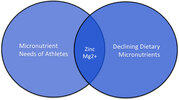01dragonslayer
Ripped
- Jacked Cash
- 482,231
Everyone knows that macros are key to high-level training and getting jacked. However, micronutrients shouldn’t be overlooked because without micronutrients your training wouldn’t even get off the ground.
We often think about micronutrients in disease states, and while that is true, they are also important for making your cells actually function. Think about it this way, macros are the fuel, and micronutrients allow that fuel to actually be used.
Pretend macros are the gasoline in your car and the micronutrients are the spark plug. You need to combust the gas to get energy in your car. You need to combust the fuel in your cells to get energy. While that analogy isn’t perfect it is a good way to think about them.
Now micronutrients do a lot more than just make carbs go bang in your cells, they regulate a ton of the processes involved in muscle growth, inflammation, insulin signaling, and a host of other important processes.
When we compare the increased micronutrient needs of athletes with the ever declining micronutrient content of our modern foods, two key micronutrients stand out: zinc and magnesium.

Apparently, some supplement wizard figured this out quite a while ago. A zinc-magnesium combo supplement is readily available and one of the more commonly taken supplements amongst athletes. Formally, it is known as zinc-magnesium-aspartate, but we will call it by its shelf name ZMA.
ZMA is one of the few supplements I actually keep on hand at all times (I can tell you the rest of my secret stash if you are interested). Let’s dive into why ZMA is a supplement you ought to consider.
Replacing the large amounts of zinc lost in the sweat of hard training athletes has been shown to prevent loses in both T4 and the more bioactive T32,4. In both these studies, the doses they were given were pretty physiological, meaning they were within the range of what you see in your normal zinc supplement.
In addition to maintaining thyroid function during hard training and cuts, zinc might also help improve glucose uptake into cells. Now, while this research is currently limited to mechanistic studies in cells and initial observations in mice it makes the case that maintaining your zinc status is probably a good idea in all respects5

There are 2 well controlled studies looking at the effect of magnesium supplementation on sleep. People taking magnesium were able to improve sleep quality and reduce sleeping cortisol levels despite having had less than desirable sleep6. In another study, taking magnesium improved sleep quality in people who were magnesium deficient7.
Related: 5 Meals to Eat Before Going to Sleep
In a randomized controlled trial, 63 subjects with type 2 diabetes and magnesium deficiency saw an improvement in insulin signaling and glucose utilization when they supplemented with magnesium8. Now, whether this will improve glucose utilization in normal healthy people we aren’t really sure, but I would rather be safe and maintain a normal level of magnesium.
We often think about micronutrients in disease states, and while that is true, they are also important for making your cells actually function. Think about it this way, macros are the fuel, and micronutrients allow that fuel to actually be used.
Pretend macros are the gasoline in your car and the micronutrients are the spark plug. You need to combust the gas to get energy in your car. You need to combust the fuel in your cells to get energy. While that analogy isn’t perfect it is a good way to think about them.
Now micronutrients do a lot more than just make carbs go bang in your cells, they regulate a ton of the processes involved in muscle growth, inflammation, insulin signaling, and a host of other important processes.
When we compare the increased micronutrient needs of athletes with the ever declining micronutrient content of our modern foods, two key micronutrients stand out: zinc and magnesium.

Apparently, some supplement wizard figured this out quite a while ago. A zinc-magnesium combo supplement is readily available and one of the more commonly taken supplements amongst athletes. Formally, it is known as zinc-magnesium-aspartate, but we will call it by its shelf name ZMA.
ZMA is one of the few supplements I actually keep on hand at all times (I can tell you the rest of my secret stash if you are interested). Let’s dive into why ZMA is a supplement you ought to consider.
Zinc
Zinc is considered a mineral and one that is easily excreted in our sweat. Because of this, athletes may be more prone to zinc deficiency than their non-exercising peers1. Zinc, while a seemingly boring supplement to take may, actually be important for you to start taking especially if you train hard.Zinc and Your Mojo
One of the worst aspects of cut cycles is your testosterone drops and your libido crashes. Seriously, ask your friend/gym partner how his sex drive was the few weeks leading up to his last show. There are several studies showing that supplementing with zinc during periods of high-training volumes and/or caloric deficits can prevent reductions in testosterone in men2,3.Zinc and Your metabolism
Besides your mojo going in the tank during peak training cycles and cuts, your thyroid levels can also plummet. Plummeting thyroid=bad, so we want to try and mitigate that.Replacing the large amounts of zinc lost in the sweat of hard training athletes has been shown to prevent loses in both T4 and the more bioactive T32,4. In both these studies, the doses they were given were pretty physiological, meaning they were within the range of what you see in your normal zinc supplement.
In addition to maintaining thyroid function during hard training and cuts, zinc might also help improve glucose uptake into cells. Now, while this research is currently limited to mechanistic studies in cells and initial observations in mice it makes the case that maintaining your zinc status is probably a good idea in all respects5
Magnesium
Let’s move on from zinc and give magnesium some love. Magnesium (Mg2+) is an atomic mineral involved in more than 300 essential metabolic reactions and plays an essential role in a wide range of fundamental biological processes. Perhaps the most notable aspects of magnesium supplementation is its effect on sleep and insulin signaling.
Magnesium and Sleep
Lifting big and eating big are great for building muscle, but they are pretty much wasted efforts if you stay up all night playing Call of Duty. Sleep is pretty essential for maximizing your gains.There are 2 well controlled studies looking at the effect of magnesium supplementation on sleep. People taking magnesium were able to improve sleep quality and reduce sleeping cortisol levels despite having had less than desirable sleep6. In another study, taking magnesium improved sleep quality in people who were magnesium deficient7.
Related: 5 Meals to Eat Before Going to Sleep
Magnesium and Insulin
Like zinc, magnesium may also be important in maintaining insulin sensitivity. Insulin works in the body via binding to the insulin receptor and then transmitting a signal through the cell to the glucose transporter GLUT4. Deficiencies in magnesium are known to disrupt this signal and decrease glucose utilization.In a randomized controlled trial, 63 subjects with type 2 diabetes and magnesium deficiency saw an improvement in insulin signaling and glucose utilization when they supplemented with magnesium8. Now, whether this will improve glucose utilization in normal healthy people we aren’t really sure, but I would rather be safe and maintain a normal level of magnesium.

